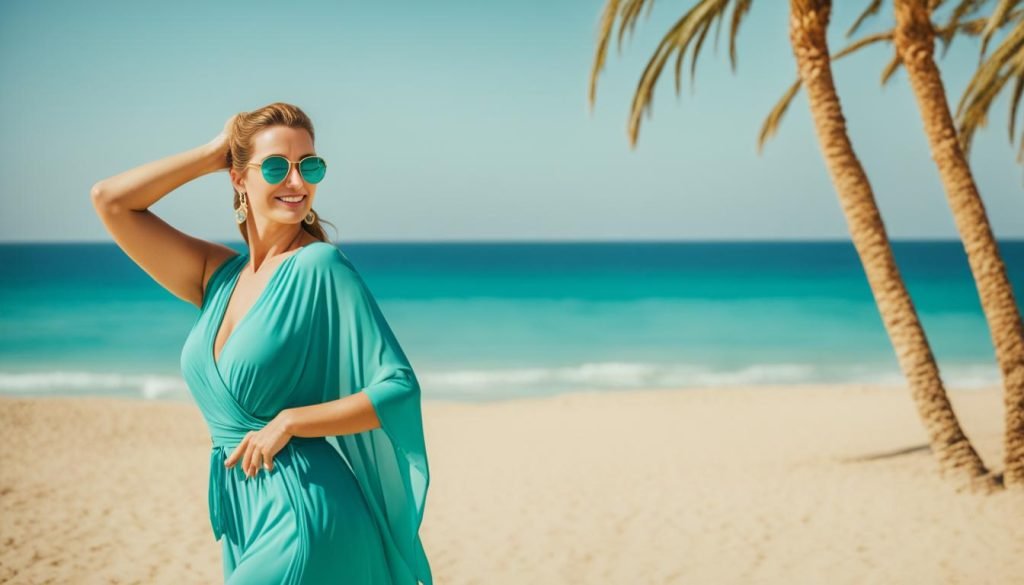It was an early morning when I arrived in Tunis. The city was alive, full of colour and sound. I was curious about how people expressed themselves while following Tunisia’s dress code. This country is a mix of old customs and new ideas. It welcomes guests with its beauty and lively culture. But there’s also a set of unwritten rules about what to wear.
Walking through the old city, I saw the importance of traditional clothes. I learned that the way you dress here can help you connect with locals. It’s about respect and fitting in. Wearing the right clothes in Tunisia is not about changing who you are. It’s about showing you understand and respect their culture and history.
In every part of Tunisia, from busy Tunis to quiet southern villages, your clothes speak for you. They show you respect their ways and traditions. You might wear a linen tunic to show respect or pick a scarf that fits in with local styles. Every choice you make about your clothes can make your visit richer and help connect with the local culture.
Key Takeaways
- Understanding the Tunisia dress code is essential for respectful cultural engagement.
- Dressing modestly is a sign of respect, especially important outside the cosmopolitan areas.
- Tunisia clothing guidelines vary by region, being more relaxed in tourist locales yet conservative in rural communities.
- Fashion choices can impact social interactions and local perceptions of visitors.
- While personal style is valued, aligning with Tunisia cultural attire norms signifies cultural sensitivity.
Understanding Tunisia’s Cultural Attire Norms
Traveling allows me to dive deep into local cultures. Grasping the Tunisia fashion norms is vital for me. Tunisia, known for its openness in the Arab world, showcases a vast range of fashion styles. This diversity mirrors its rich history. Looking around, one sees different styles showing various conservative levels. Yet, modesty links them all, especially important outside the main tourist areas. This modesty is key in Tunisia’s heartlands, a true Mediterranean jewel.
I always respect the cultural context of my destinations. Following Tunisia clothing restrictions helps me connect better with locals. It’s not just about merging in but respecting their traditions. This respect has opened doors to their community and their hearts. In Tunisia, clothes are more than just a personal choice. They’re a bridge to understanding local life.
Throughout my trip, I’ve seen a lot of cultural attire Tunisia offers. From Sousse’s coastal charm to Carthage’s historic vibes, my clothing choices mattered. Adjusting how I dressed was about being culturally aware, not losing my style. Visiting markets, museums, and mosques in appropriate attire helped me bond with the Tunisians. It showed that respect is the best fashion statement.
Here are some highlights of how dressing impacts experiences in Tunisia:
- Modest dressing in medinas opened warm interactions with artisans, eager to share their work.
- In rural areas, avoiding sleeveless tops and short skirts led to respectful chats and deeper local insights.
- Choosing modest swimwear on beaches earned positive reactions from the locals.
Exploring Tunisia taught me the elegance of cultural dressing. Fashion goes beyond cloth; it’s a language of respect and connection.
Principal Considerations for Women’s Clothing in Tunisia
As a fan of travelling and immersing in cultures, I stress knowing local clothing norms. For women in Tunisia, dressing involves balancing personal style and respect for customs. Let’s explore suitable wear in Tunisia’s diverse settings.
Moderate Dress Standards in Metropolitan Areas
In Tunisia’s cities, you find a blend of modern and traditional in fashion. Women can dress chic yet modest. Wearing smart-casual dresses or tunics with leggings works well. You feel comfortable while respecting the culture. However, keep aware of the local dress codes.
Following Modesty Traditions in Southern Regions
Heading to Tunisia’s south means dressing more conservatively. This shows respect and opens doors to positive local interactions. Opt for long skirts or trousers and sleeved tops. Modesty in these areas is key, showing deep respect for traditional values.
Adapting Fashion Choices While Visiting Religious Sites
When visiting holy places in Tunisia, dress with extra care. Sites like the Grand Mosque of Kairouan demand respect in clothing. Choose full-length skirts or loose trousers, and cover your shoulders. Wearing a headscarf shows the highest regard for these sacred spots.
Reflecting on Tunisian women’s clothing, it’s clear that understanding local dress codes enhances travel. It merges tradition with modern life. This approach introduces us to a culture that values hospitality and decency.
Navigating Men’s Dress Code in Tunisia
When in Tunisia, I always consider local styles and customs for my clothes. Tunisian men’s clothing blends comfort and formality. This balance is perfect for the country’s warm weather while keeping fashion respectable. I’ve noticed Tunisian men combining traditional and modern styles effortlessly.
In many Tunisian areas, jeans and short-sleeve shirts are popular. They’re ideal for staying cool and looking sharp. Whether exploring markets or visiting cafés, looking neat and proper is key.
Adopting an attire that is both stylish and culturally respectful isn’t merely about appearances; it’s a conduit to gracious interactions and deeper connections with the locals.
Here’s a quick guide to male travel wardrobe essentials in Tunisia:
- Casual daywear: Jeans or smart knee-length shorts, with polo shirts or cotton tees.
- Dinner attire: Long-sleeve cotton or linen shirts with smart trousers.
- Religious settings: Outfits should include long trousers and long-sleeve shirts to respect sacred places.
| Occasion | Recommended Attire | Notes |
|---|---|---|
| Urban Exploration | Jeans, Chinos | Choose lighter fabrics for the heat. |
| Coastal Areas | Shorts, Breathable Shirts | Knee-length is respectful. |
| Evening Out | Smart Casual | Collared shirts improve the look. |
| Cultural Sites | Modest & Respectful | Skip shorts; choose trousers and tops with sleeves. |
Understanding Tunisia’s clothing culture means respecting fashion nuances while expressing oneself. Choosing outfits that align with respectable Tunisian fashion pays tribute to cultural values. It also makes my travels more enriching. Thus, the men’s dress code in Tunisia is more than tips; it’s a bridge to deeply experiencing this colourful country.
Tunisia Clothing Guidelines for Tourist Hotspots
Enjoying the sun in Tunisia means dressing suitably. It’s about comfort and respecting customs. Hammamet allows relaxed beach wear. Yet, we must balance modern styles with Tunisian expectations.

Appropriate Beachwear for Men and Women
In coastal spots, beachwear is similar to what’s seen around the Mediterranean. Travelers and locals wear various styles. My beach gear includes shorts and light, quick-dry clothes. This matches appropriate beachwear Tunisia rules. Here, everyone can pick swimwear that suits them, from bikinis to longer trunks.
Selecting Swimwear for Respectful Recreation
I keep Tunisia swimwear guidelines in mind when choosing beach clothes. It’s important to pick items that are right for the beach but also respect Tunisia’s more modest dress code. Women might want to wear more cover-up for walks or in conservative coastal areas.
| Location | Women’s Beachwear | Men’s Beachwear |
|---|---|---|
| Resort Beaches | Tankinis, bikinis with cover-ups | Board shorts, swim trunks |
| Rural/Conservative Areas | One-pieces, rash guards | Longer swim shorts, rash guards |
| To and From the Beach | Dresses, kaftans | T-shirts, lightweight trousers |
Visiting Tunisia is a chance to enjoy beautiful beaches and culture. By following Tunisia swimwear guidelines, I’ve engaged with locals and traditions. Making respectful choices enhances travel and helps connect with Tunisia’s community.
Footwear Advice for Comfy Exploration
Choosing the right footwear is crucial for enjoying Tunisia’s beautiful landscapes. As a fan of comfortable exploration, I’ve put together some footwear advice for Tunisia. It will help you whether you’re strolling through the medina or walking on ancient stones. The key is to find shoes that fit the terrain and weather.
In the hot summer, sandals for Tunisia are both stylish and practical. They let your feet stay cool and breathe. Look for durable sandals with strong soles. They’ll allow you to walk comfortably by the sea or through busy markets.
However, when it’s cooler or your plans include walking on rough paths, walking shoes in Tunisia are the best choice. Good walking shoes offer the right grip and protection. They are perfect for exploring ancient ruins or the desert. Make sure they are comfortable, offering support where needed.
- Avoid high heels and flimsy flip-flops as they don’t suit cobblestone streets or country walks.
- Closed-toe shoes are often needed for religious sites or traditional homes out of respect.
- Choose shoes that fit well to avoid blisters, which new sandals can sometimes cause.
| Activity | Recommended Footwear | Benefits |
|---|---|---|
| City Exploration | Breathable Walking Shoes | Durability, Comfort |
| Beach Outings | Quality Sandals | Coolness, Ease of Wear |
| Historical Sites | Sturdy Walking Shoes | Support, Protection |
| Casual Evenings | Stylish Closed-Toe Flats | Comfort, Cultural Acceptance |
Sandals and walking shoes can both be great for your wardrobe in Tunisia. They let you enjoy all it has to offer. The best footwear advice for Tunisia I can give is to think about what you’ll be doing and the season. Picking the right shoes can make your trip much better.
Accessorizing Strategically Throughout Your Stay
On my travels in Tunisia, I discovered choosing the right Tunisia travel accessories matters a lot. It’s not just about looking good. It also means being practical and showing respect for the culture. For instance, having good sunglasses is vital to protect your eyes from the strong Tunisian sun.

Adding headscarves Tunisia can enhance your experience. They’re not always required but show respect in rural or religious places. Locals often appreciate it when travelers wear local or geometric headscarves.
When it gets colder at night, a pashmina becomes essential. It keeps you warm and adds a bit of style to your evening. Pashminas are perfect examples of Tunisia cultural accessories. They combine usefulness with local style.
- Quality sunglasses protect from intense sunlight
- Headscarves as a mark of respect in specific settings
- Pashminas for elegance and warmth when the sun sets
The right accessories do more than just look good. They show you respect Tunisia’s culture. This makes my trip both respectful and fashionable.
“Can You Wear What You Want In Tunisia?” – A Closer Look at Freedom of Dress
I’ve explored Tunisia clothing customs deeply. I found a balance between freedom of dress in Tunisia and respecting cultural norms. This balance allows for personal expression while honouring Tunisian traditions. My travels across towns and cities showed me a rich mix of old and new.
Balancing Personal Style with Tunisian Etiquette
Discovering Tunisian fashion has been enlightening. Wearing what you like is possible if you’re mindful of local traditions. As a traveller, I’ve learnt to mix my style with Tunisia’s decorum. By doing this, I get to enjoy Tunisian life’s vibrancy without disrespecting its culture.
Perceptions of Clothing Choices by Locals
Speaking with Tunisians revealed their views on visitor attire. They appreciate it when visitors respect their tradition while being open. Freedom of dress in Tunisia means respecting each other’s values. Efforts to adapt are noticed by locals and often lead to more enriching experiences.
| Attire | Acceptable in Urban Areas | Acceptable in Rural/Conservative Areas | Suitable for Religious Sites |
|---|---|---|---|
| Jeans / Trousers | Yes | Preferred | Yes |
| Knee-length or Longer Skirts | Yes | Yes | Yes, with Appropriate Topwear |
| Sleeveless Tops | Common in Tourist Areas | Less Acceptable | No |
| Traditional Tunisian Attire | Appreciated | Highly Regarded | Respectful Choice |
Navigating Tunisia’s societal mix has been a journey. I’ve found places where my personal style fits well. It’s a compromise that has let me discover the real Tunisia. And it’s a compromise I gladly make.
Seasonal Wardrobe Suggestions for Tunisia Travellers
Planning a trip to Tunisia means thinking carefully about what to wear. Fit in with the locals by choosing the right clothes. It’s important to pick outfits that suit the weather and respect local customs. Whether it’s Tunisia’s hot summers or cooler winters, dressing right is key.
Dress Code Tips for Tunisian Summers
In the Tunisian summer, I wear light and airy clothes. Fabrics like cotton and linen keep me cool and comfortable. I opt for long sleeves and skirts to avoid unwanted attention and stay respectful. My goal is to honour local traditions while enjoying the summer sun comfortably.
Winter Wear: Combining Warmth and Decorum
When winter arrives, my clothes change too. In Tunisia’s cooler months, I go for layers to stay warm yet stylish. Jeans, jumpers, and jackets are my go-tos. They keep me warm but also look good. In the evenings, I choose smarter clothes to respect Tunisia’s customs. No matter the time of year, I aim to dress thoughtfully, respecting local traditions and the weather.







